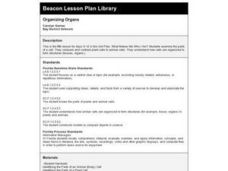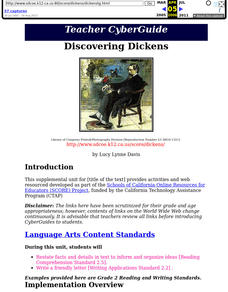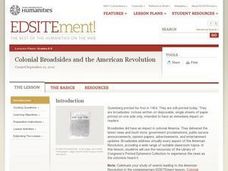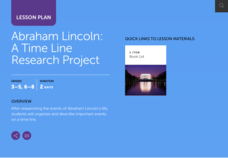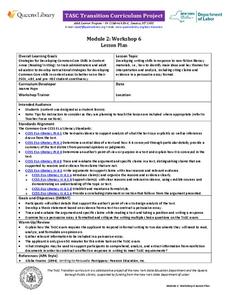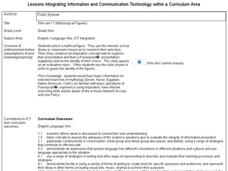Curated OER
Hurricane Katrina: You Be the Reporter
Learners work in a small group to create news stories, feature stories and editorials/letters to the editor and organize them in a podcast, video-based program, or newspaper/magazine focused on Hurricane Katrina.
Curated OER
Sorting
Students sort class books into categories to help classify and organize them so they are easier to find. In this sorting lesson plan, students go to the library and see how they organize their books and do the same in the classroom.
EngageNY
TASC Transition Curriculum: Workshop 15
What do a cheetah, Audi commercial, and air have in common? They're all topics of an engaging inquiry-based, hands-on workshop for educators about background knowledge, reading strategies, the CER model, and argumentative writing. The...
Curated OER
Tangerine: Concept/Vocabulary Analysis
Designed for teachers who use Tangerine in the classroom, this resource provides background information on the novel, issues raised by the story, and literary devices Bloor employs. A good addition to your curriculum library.
Curated OER
The American Dream
Students define the American dream. In this primary research lesson plan, students search the Library of Congress digital collections for primary sources regarding the ideal of the American dream. Students create presentation to...
Curated OER
Who? What? When? Where? Why? How? So What?
Seventh graders master the SQ3R method. They begin reading for a purpose and organize thoughts through categorizing them. They write in their notebooks what they think about the lesson and the classroom for the day and write a...
Curated OER
Organizing Organs
Fifth graders research plant and animals cells and create a Venn Diagram to show the similarities and differences.
Curated OER
Discovering Dickens
Students restate facts and details in text to inform and organize ideas and have a choice of four activities to enhance learning,
Curated OER
What Do I Want to Research?
Study the eight slides that detail the steps to writing a research report. The steps include brainstorming for ideas, constructing graphic organizers, and writing the final research product. An example of each step is given on each...
Curated OER
To Kill a Mockingbird: A Historical Perspective
Students research the Great Depression. In this Great Depression lesson, students analyze primary sources to develop an understanding of life in the American south during the depression era as they read Harper Lee's To Kill a...
Curated OER
Colonial Broadsides and the American Revolution
Students access the Library of Congress's collection of Broadsides (printed material with news, entertainment, advertisements, etc.) and explore their impact on events leading up to the Revolutionary War. They create a timeline with...
Howard Hughes Medical Institute
Survival of the Fittest - Variations in the Clam Species Clamys sweetus
It's not often that you come across a clever laboratory activity that is both imaginative and comprehensive! Using M&M's and Reese's peanut butter candies to represent two different clam species, young biologists test for "relative...
Curated OER
Note-Taking: K.I.S.S. "Keep It Short and Simple"
Note-taking is an essential study skill, and it needs to be taught! In the context of a research project on energy sources, learners find multiple sources, evaluating, paraphrasing, and citing them correctly. Two lists with note-taking...
Scholastic
Abraham Lincoln: A Time Line Research Project
Though Abraham Lincoln's life was tragically cut short, it was filled with accomplishments and inspiring moments that continue to influence American democracy. Explore the ways the 16th president of the United States made his way from a...
Curated OER
Trip to an Art Gallery
Have your Spanish speakers give museum tours with this interactive plan. To simplify this entertaining idea, bring in art pieces and create a gallery in your very own classroom. Provide the names of different works of art and have your...
Curated OER
Comparing the Ancient and Modern Olympics: A Venn Diagram
Students compare and contrast today's Olympic Games to those held in ancient Greece. They read newspapers, conduct Internet research, watch TV coverage of current Olympic Games and organize their findings on a Venn diagram.
Curated OER
Immigration For Grades 3-5
Students engage in a lesson that is concerned with the concept of immigration. They conduct research using a variety of resources. Students create a KWL chart to organize the information. The lesson also includes a resource link for the...
EngageNY
TASC Transition Curriculum: Workshop 6
Is a college education necessary for success in today's world? The class investigates the question, along with others at the end of the sixth workshop in a 15-part series. The lesson has four parts with multiple activities and...
Facing History and Ourselves
Who Are We?
Sixth graders explore the diversity of communities. For this community-building lesson, 6th graders compose biopoems and create a classroom exhibit entitled "Who am I? Who are We?"
Curated OER
Find Figurative Language
Meet with the school library specialist and work together to plan a visit and presentation on figurative language. After defining and examining examples of targeted terms, the class travels to the library where the SL has collected...
Curated OER
Carnavals and Colonialization
Ninth graders compare and contrast different Carnavals throughout Latin America. In this Latin American lesson, 9th graders study the geography and colonial history of Latin America.
Curated OER
Who am I ?
Ninth graders select a mythical figure. They use the internet, school library or classroom resources to research their selection. Students construct an Inspiration concept web to organize their presentation and then tie in their...
Curated OER
Using Inspiration Software to Explore Characters In Stories
Students identify characters, their qualities, and examples of their qualities and use Inspiration to organize them in a clear and understandable format. After a lecture/demo, students use the program on the next story by themselves.
Curated OER
Let's Play Scrabble!
What do Alfred Mosher Butts, James Brunot, and Jack Straus have in common? They were all instrumental in the development of Scrabble. Class members will discover these facts and many more as they conduct a WebQuest to gather, organize,...








